
January 09, 2009
Happy New Year!
(I recommend that you double-click on this e-mail in your inbox to open it properly. You will then have a better view of all the text and pictures. Note that it may take a few minutes for all the pictures to open.)
If you can not see the pictures included in this mail, you can view our Newsletter on the Web. Just click here!
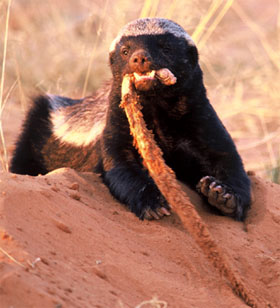
Read in this Newsletter about:
- Wishes for 2009
- Another typical Kalahari Summer
- Summer Project: A Website
- Your new wallpaper: Stunning Sunset
- Maria's Interesting Kalahari Fact
- Hunting Guest Pictures!
- Honey Badgers
- Great Article on Rifle Calibers
- New African Hunting Stories
- Spiritual Comfort
- For Your Enjoyment...The best of technology
Picture top right: The world's 'most fearless animal' - according to 2002 Guinness Book of Records: the Honey Badger.
Africa Hunting for Women? Read Terri's Review
Best Wishes for You
Since Christmas and New Year have come and gone already... we as a family would like to wish all of you a special 2009! May you be blessed in special ways this year and may God bestow his Love and Mercy upon you and your family.
New Year is a time for celebration of love and life. It's the time to thank God for wonderful friends, health, family and basic things like food and shelter.
It is also a time to celebrate friendship. So... here's to friendship and the magic it brings. May your family and friends also bring magic to your life this year as much as our clients and guests bring each year to us.
For those of you who will be hunting with us this year: we pray that your visit to the Kalahari will be magic for you and that the memories will last a lifetime.
How we celebrated in the Kalahari
This Christmas and New Year we also had the privilege to spent it together as a family. After being very busy with the renovation of our house and the essential team of 9 workers for 6 months in our yard, it was so wonderful to be alone again and to just enjoy our unique privacy on the farm this time of the year.
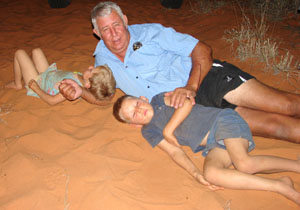 Before Christmas we went for a "braai" (barbecue) on a dune to celebrate our sister's birthday. They live in the city and it was her wish to spent it this way. We only took food with us. The children played in the red sand till late and fell asleep near their grandfather Hendrik (see picture).
Before Christmas we went for a "braai" (barbecue) on a dune to celebrate our sister's birthday. They live in the city and it was her wish to spent it this way. We only took food with us. The children played in the red sand till late and fell asleep near their grandfather Hendrik (see picture).
To most people in the world this may sound boring.
But to be in nature like this with only loved ones and a campfire for company in a starlit darkness... surrounded by the remoteness of the Kalahari with only the heavens as ceiling... This is something money can not buy. We cherish times like these and feel about this land:
"This God-forsaken land they call it
As they gaze with pitying eye
Nothing here but hills and bush
And a vast expanse of sky'We don't know how you stand it'.
Those city folk declare
'And how do you make a living
Or do you live on air?'They wonder at the twinkle in our eye
And the smiles we try to hide..."This loneliness they talk about
To us it's God's own peace
There's so much beauty all around
That our thanks shall never ceaseWe don't know much of city life
Or where they seek God there
But we do know in the Kalahari
That we find Him everywhereSo tell them we'll leave the cities
Where the living is so grand
And we'll stay here...
In our much beloved Kalahari land.(Adapted. Unknown Author)
Another Typical Summer in the Kalahari
We are having a very typical summer in the Kalahari. Although the northern and central regions of Namibia already had lots of rain this season, we in the farther eastern parts have missed out on this essentiality. 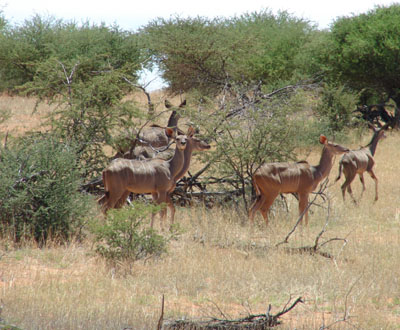
(Picture: A herd of young Kudus on Uitspan Ranch. The bit of greenery as visible on the picture has since disappeared.)
After one good shower in October, bushes and trees bloomed with new leaves and new grass started to grow.
However, shortly afterwards the heat of summer arrived and since we didn't get more rains, the new grass died. This is a cycle we often have to witness during the years and it always makes us aware of just how dependent we are on God's mercy - specifically in terms of rain for the Kalahari.
We also experience some days of extreme heat. On such days it is almost as if the land lies comatose under the scorching african sun and animals hide under any shade they can find. The heat of the Kalahari is dry and burning (as if the sun is a nearby fire) with no humidity at all. It is very much different from the heat of places near an ocean or the equator where it rains more often.
So... at this stage it is still very dry and we really need rain. Please pray for rain so that there can be growth and thus food for the animals.
Summer Project: A Website
I was asked in October 2008 to design a website for a local private school. Although I felt at the time that I do not have nearly enough time to take on such a time-consuming project, I couldn't resist the challenge.
It took a lot of time and although it is still not finished, I enjoyed every moment of working on this very different kind of website (compared to our hunting business'). The best reward for me is that the headmaster, school board and parents are very happy with the result.
You can have a look at the website I designed at the following link (it is in our home language, Afrikaans):
Click here to read more about the best way to build a website!
Exclusively for you, our subscribers:
- The new free Kalahari Wallpaper for you this month, is a picture of beautiful rainclouds - always a welcome sight in Namibia! I couldn't resist sharing this spectacular scene with you. This picture was taken on the afternoon of January 8th, 2009.
Remember that the password to see this page is:
uitspanranch453
- Back Issues of our newsletter are now only available to you as subscribers.
If you wish to see previous issues of our newsletter Kalahari Hunting News, click here to find those Back Issues!

Maria shares an interesting fact about the Kalahari...
(Our daughter Maria is 10 years old and I asked her to write down an interesting fact about the Kalahari or any of its animals for every issue of our Newsletter. I'm sharing it as she wrote it down.)
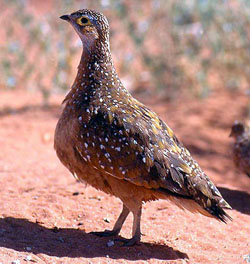
Getting water a clever way!"As you know, the Kalahari is a dry and very hot place. But there is a kind of bird, a Sandgrouse, that help their young ones with water in an interesting way.
Because of the dry seeds they eat, they don’t get enough water for their young ones. When the time comes that they have to start nesting, the male Sandgrouse sets of to find water every morning. They sometimes have to fly up to 60 kilometres a day to find water. When he succeeds in finding water, he land and soaks his belly feathers in it. Those belly feathers act like a sponge and suck up water. Then the Sandgrouse flies straight back to his nest, with the belly feathers still full of water. When he comes there, the water is super-cool for the young ones! The chicks drink by combing the water out of the feathers with their beaks.
A cold water-bottle indeed!"
(Picture: Namaqua Sandgrouse)
The Kalahari will reveal itself
to only those who
seek with a true heart...
Hunting News / Pictures / Stories
John Palffy and his son Richard from Australia hunted with us in September 2008. We've included some of their hunting pictures in the previous issue of our Newsletter.
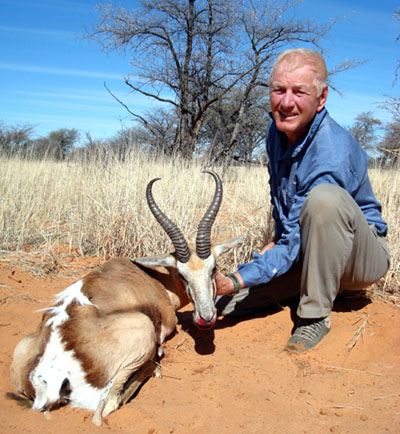
(Above: John with the Springbok he took in the Kalahari)
John has since wrote a detailed report/review of their Kalahari hunt.
Due to the length and all the pictures, I've made a separate page on our website. So, please take a moment and read John's version of hunting in the Kalahari on Uitspan Ranch. You can leave comments if you like!
Thank you, John and Pam, for sharing these details of your hunting experience with all visitors to our website.
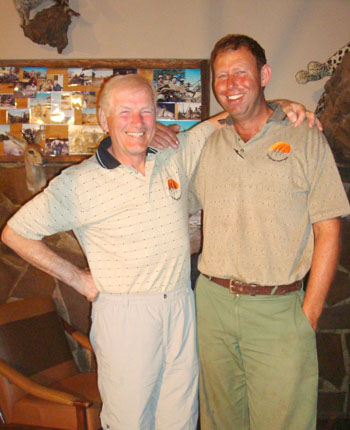
(Picture: Hunter and PH shared great times together.)
Since September, we haven't hunted with guests. We may sometimes take bookings for this time of the year (up to the closing date of Namibia's trophy hunting season, November 30th) but we definately prefer not to. This is to ensure that capes and trophies of our clients do not go bad in the Kalahari's heat.
We would like to share with you the story and picture of an exceptional Leopard taken in central Namibia during September 2008.
After the picture and story were published in a local newspaper, it became a really controvertial issue, although this Leopard was hunted with all the necessary permits. Hunting predators seems to many people brutal, irresponsible and unnecessary. That is one side of the story. There is another side.
We know just how many losses some of these predators can cause. And note that not all predators cause problems on farms and premises (see also the Honey Badger info below). But once they've started killing sheep and/or attacking humans (as easy prey), I can assure you: they will NOT change their ways.
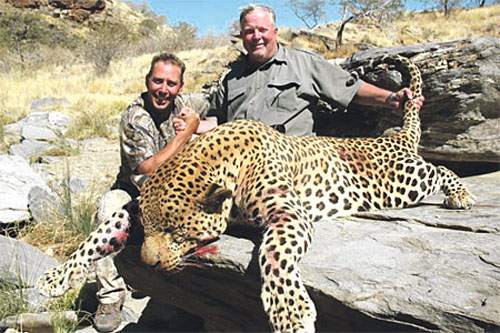
Below is the story as told by the PH (who guided the hunter on this Leopard hunt) on a hunting forum:
"The owner, Mr Engels, contacted me in April to inform me that he has a problem leopard catching his heifers and that he lost close to 50 the last 36 months.
I was baiting this particular monster for 2 1/2 months, in this period he walked passed my bait 12 times. Anybody that has hunted problem cats in the past will know, that this is a sign that he was a clever cat and that he was probably caught in a leg trap or something previously.
After trying every trick in the book, we decided to get hounds to take care of the problem and lots of frustration. We shot him @ 11h00 in a deep canyon, I knew he had a big track, but never thought they can get this big. I have hunted leopards the last 15 years of my career and this is by far the biggest one, body and skull wise that I have hunted successfully.
Officially from SCI this cat will be the new # 8 on SCI in all of Africa and will be the new record taken out of Namibia. Like somebody mentioned earlier, I also do not care about record books etc. but this was a "monster" in every aspect of the specie. Namibia has big cats, I just think none of us Namibian Pro Hunters ever cared about entering it into the SCI Record Book. This will soon change, trust me!
I am a Master Measurer and did measure it several times. The score ended up to be 18 4/16(dry), the body was not that long(7.2 feet), he weighed 185 pounds. Length and weight are irrelevant, because if he had a full stomach, he would have weighed over 200 pounds. Something very interesting I thought, was that his tail had a circumference at the base of 10 inches."
Recent encounter: Honey Badgers
Known as Ratel, Honey Badger or Mellivora capensis, this animal was listed in the 2002 Guinness Book of Records as "the most fearless animal in the world".
If Lions and Leopards do not ordinarily attack them, and dogs always come second in a fight with them, how can we as humans then underestimate the abilities and strength of this tenacious small carnivore.
Some background information on Honey Badgers:
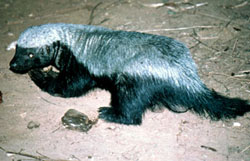
Honey Badgers are not as common here in the Kalahari as Black-backed Jackals, Wild cats, Caracals and some other small predators. However, farmers immediately recognize the typical signs on domestic animals whenever this member of the badger and skunk family has arrived among livestock. These signs include pieces of skin and meat of victims ripped out; udders of ewes eaten out; huge wounds on bodies of lambs, etc.
Usually when other predators prey on livestock, one notices the presence of Whitebacked vultures. Closer inspection then leads one to carcasses and tracks of whatever predators caused the deaths.
However, with Honey Badgers it is different. Livestock or sheep victims are badly wounded and get feverish and very sick, but they do not necessarily die immediately. So farmers usually do not notice their presence on the farm and in the meantime, more havoc is caused.
As a successful hunter, scavenger and forager, the Honey Badger eats a variety of foods including the young of large mammals, rodents of all sizes, birds, reptiles (a lot of snakes), insects, fruit and carrion - and of cause, honey.
Unlike Jackals and Caracals, they do not always attack sheep on sight. Sometimes we found tracks of Honey Badgers on the ranch and leave them be if they do not start preying on livestock.
The Honey Badger has short legs and stout claws and is a strong burrower and a good climber. About 2 ft (61 cm) long excluding the tail, it has a coat that is black on the lower half of the body and pale gray above. The Honey Badger resembles its distant relative the skunk in coloration and in the possession of the anal scent gland. A thick loose coat protects it against snake bites and insect stings.
Whenever a Honey Badger is cornered or hunted, it then emits smelly, suffocating secretions from its anal glands. This is also used to fumigate beehives, causing most of the bees to flee.
Our recent encounter:
About two weeks ago, we were contacted by one of our neighbors Hentie Visser. He thought that there was a Honey Badger on his farm, because he has found some sheep that were severely bitten and mutilated (see picture). 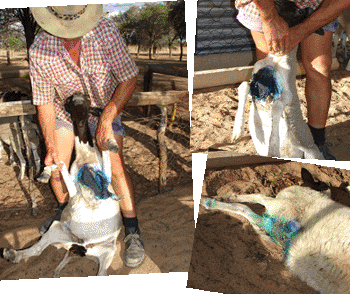
(Picture: Hentie with the sheep which were attacked by these Honey Badgers. Pieces of meat were ripped out. The blue and purple coloration is medicinal spray on the wounds.)
Some lambs had their skin teared open from under their necks to between their hind legs.
The tracks looked like that of Honey Badgers, but he was not 100% sure that it is not the tracks of Porcupines (the tracks of these animals look very similar), although Porcupines will never attack livestock.
Michael went to help investigate. It was indeed two Honey Badgers. This was confirmed by the fact that lots of dribbled saliva (a typical sign) were visible on the tracks. Also, the tracks of Porcupines appear more firm in the Kalahari's sand since the Honey Badger's rolling trot makes it's tracks appear loose.
The Honey Badgers had to be hunted down. We tracked the badgers one whole day and at noon the next day the tracks went into a burrow. Traps were put in front of the burrow and this did the trick.
After one of these badgers were shot (a headshot), it appeared dead for ± 5 minutes. Then it suddenly started to breath and move again (we've heard of a case where a badger were bitten by a cobra and appeared dead for 2 hours before it started to move again). This seems to be very common thing of badgers.
The absolute suffocating smell near the burrow was unbelievable!
In the end it turned out that, according to Hentie's findings, 12 sheep were bitten and maimed. Some of them died and other are still treated to see if the wounds will heal (see picture above).
On the picture below is our neighbor, Hentie, with the guilty Badgers (a female and her young one).
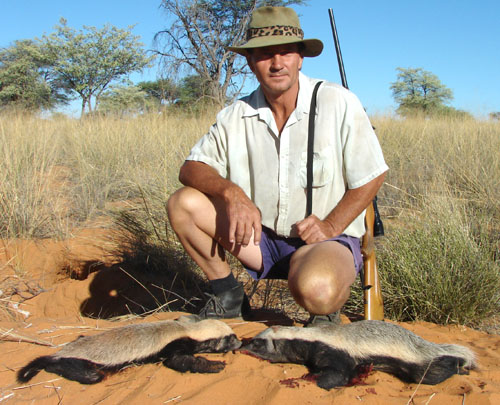
Did you know...?
- The Honey Badger does not have external ears. Rather, the ear is enclosed in the skin, with an opening that can be closed to keep out dirt when it is digging.
- Honey Badgers can dig itself a burrow within two minutes.
Click here to visit our site's Books and DVD-page. On the bottom of that page you can see the ad of a great DVD on Honey Badgers in the Kalahari. It is called "Snake Killers: Honey badgers of the Kalahari". Get it if you are interested in these exceptional animals.
You can also click on the following link to see a very interesting video of Honey Badgers on You Tube:
View here the Honey Badger-video!
Special Hunting Packages
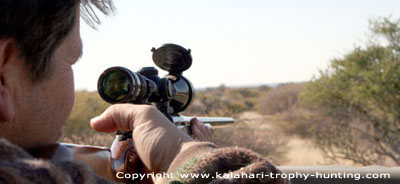
Click here to have a look at the updated SPECIAL HUNTING PACKAGES we offer!
Find here info on Namibia's Trophy Hunting Regulations
New Content on Kalahari-Trophy-Hunting.com
We received new African Hunting stories on our website. They are - as all the other submissions - like going on a Safari!
Enjoy...
 A First Impala Hunt by Mike Cramer
A First Impala Hunt by Mike Cramer Warthog! by Stephan Hofmann
Warthog! by Stephan Hofmann Zebra Double! by Stephan Hofmann
Zebra Double! by Stephan Hofmann
(If you would like, you can click here to read all the submitted Hunting Stories!)
- Five Rifle Calibers for International Hunting
Do not miss this very informative article by Stephan Hofmann. The link above will open it for you. - Air Travel Tips - For Hunters Traveling to Africa
Add YOUR advise and comments to this page to help future travellers with their plans and logistics. - An Action Video and Facts about the Caracal
Any comments on Kalahari Hunting News?
It is always great to get feedback.
So... please take a moment to Comment Here!
Interesting Articles on Hunting
- Most of us have had conversations with people who does not like hunting or who doesn't understand the reasons for hunting.
Well... you'll never again wonder what you should tell such a person if you read this.
To read, click on Reasons For Hunting
Spiritual comfort... the Bread of Life
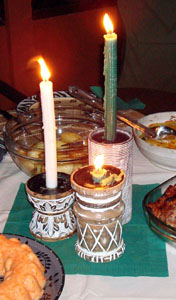 May the Word of God serve to become also in you a well -
May the Word of God serve to become also in you a well - "...But whosoever drinketh of the water that I shall give him shall never thirst; but the water that I shall give him shall be in him a well of water springing up into everlasting life." (John 4:14)
Glory at the end of the road
Read Psalm 73:24
What lies in store for us in the year we entered we know only in broad, general terms. But we know not how long we will continue in this valley where the shadow of death is cast. For some, today will be the last day in this vale of tears. Others may be here for another week or month. Some of us will live through this whole year and beyond. And created as thinking, willing creatures we have faculties whereby we can and do plan, and whereby we judge whether what we desire to see happen this year is threatened by what takes place round about us.
The big question, however, is not whether the wishes of our flesh will be fulfilled. The all-controlling question is not what the year will bring to us, but where the year will bring us.
And the Word of God contains such comfort for the child of God, because it not only tells us where we are going, but also assures us that all that which the year brings us will, without one exception, bring us to the glory of the kingdom of God's dear Son. For the psalmist declares in Psalm 73:24, "Thou wilt guide me with Thy counsel and afterward receive me to glory."
Take that truth with you today and every day throughout the years of your life. The all-wise and almighty God has the glory, of those whom He purchased by the blood of His Son, planned to the smallest detail. If you belong to that innumerable host that He gave to His Son, you will find heavenly glory at the end of the road you now travel on this earth.
Sing then that truth of Psalm 73:24 as versified with these words:
My soul with Thy counsel
Through life Thou wilt guide,
And afterward make me in glory abide.
Sing it as soon as you wake up in the morning and face a new day. Sing it no matter what the day may bring you. For all that happens is bringing you to the glory Christ Himself now has and has purchased for His people.
Quote for Reflection:
Our Hope for the New Year: "…let the dawn of the first day of the year find us on our knees, humbly seeking the face of Him who revealed Himself in Jesus Christ our Lord. Not to ask Him for things He will never give. Not to seek the things that are on the earth. But to leave all things to Him, if only we may be assured of His everlasting mercy. Then all will be well!
'Let thy mercy, O Lord, be upon us, according as we hope in thee.' (Psalm 33:22)."
~ Herman Hoeksema
We thank the PRCA, who made this Daily Meditations of Rev. Heys available for our Newsletter. Read more about their missions, literature and wonderful publications on their website PRCA.
For Your Enjoyment...The best of technology
 Three women, two younger and one senior citizen, were sitting naked in a sauna.
Three women, two younger and one senior citizen, were sitting naked in a sauna.
Suddenly there was a beeping sound. The young woman pressed her forearm and the beep stopped. The others looked at her questioningly. 'That was my pager,' she said. 'I have a microchip under the skin of my arm.'
A few minutes later, a phone rang. The second young woman lifted her palm to her ear. When she finished, she explained, 'That was my mobile phone. I have a microchip in my hand.'
The older woman felt very low-tech. Not to be out done, she decided she had to do something just as impressive.
She stepped out of the sauna and went to the bathroom. She returned with a piece of toilet paper hanging from her rear end.
The others raised their eye brows and stared at her. The older woman finally said,
'Well, will you look at that.... I'm getting a fax!!'
If you like this e-zine, please do a friend and me a big favor and "pay it forward."
If a friend DID forward this to you and if you like what you read, please subscribe by visiting...Kalahari Hunting News or leave us a message here!
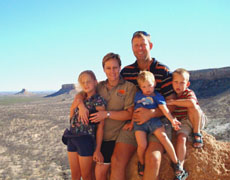
I created this website with the help of SBI. Click here to read about my experience...!
Till next time...
"Blessed is every one that feareth the LORD; that walketh in his ways.
For thou shalt eat the labour of thine hands: happy shalt thou be, and it shall be well with thee."
(Ps.128:1)
Greetings from
Uitspan Hunting Ranch, Namibia

